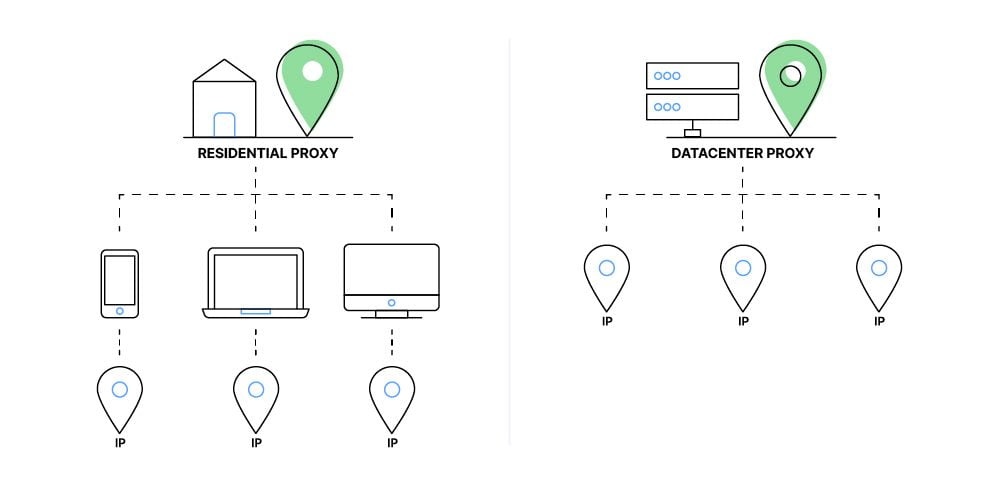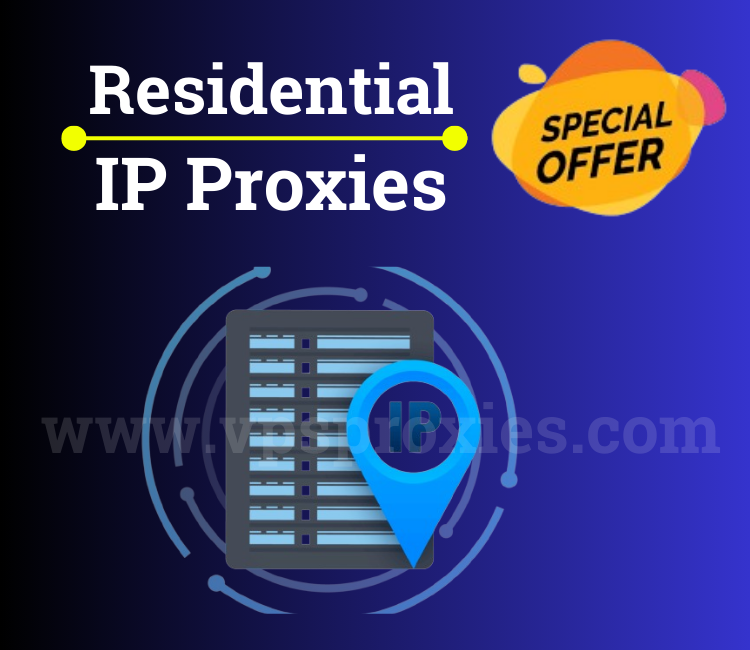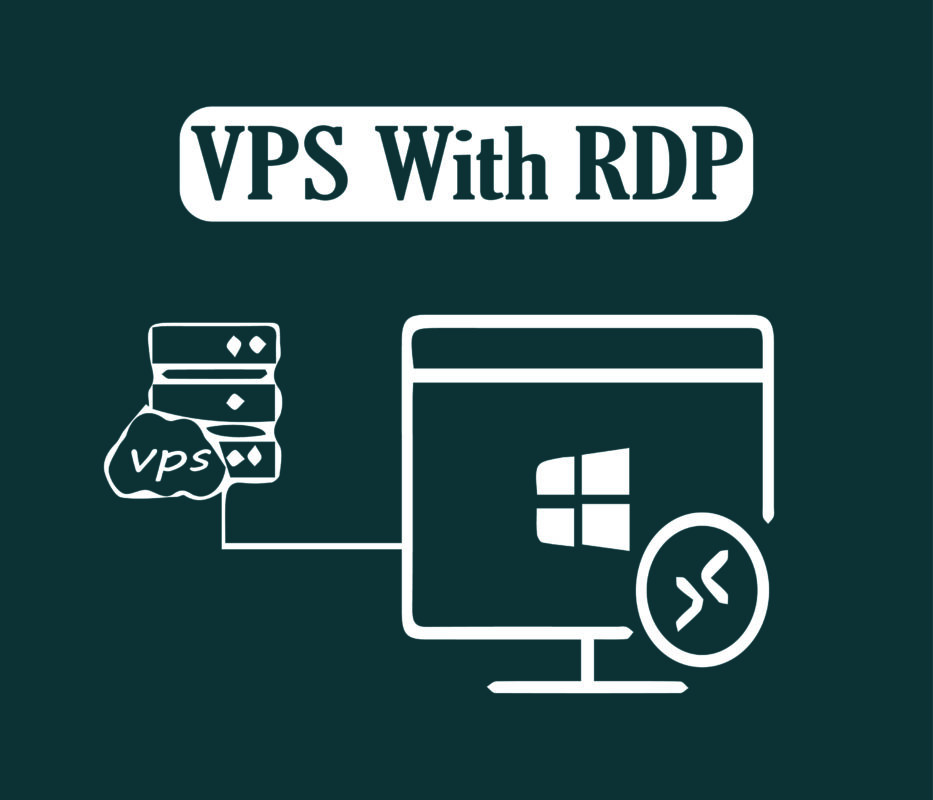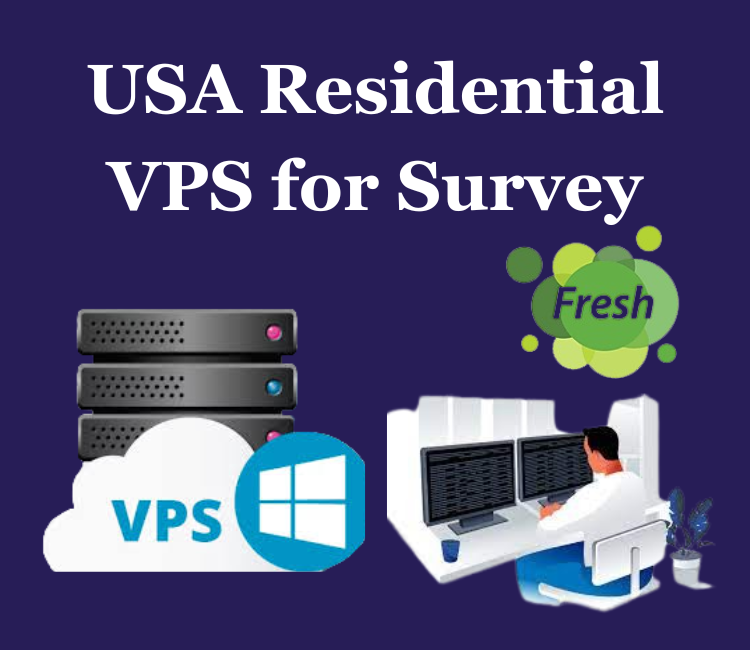Datacenter proxies and residential proxies are two types of proxies that serve different purposes and have different characteristics.
Datacenter proxies are created in a data center by a third-party provider. These proxies are not associated with an internet service provider (ISP) and do not have a physical location. They are typically faster and more affordable than residential proxies, and they offer high anonymity and stability. Datacenter proxies are commonly used for web scraping, automation, and other online activities that require high-speed, high-volume connections.
Residential proxies, on the other hand, are IP addresses assigned to residential devices, such as desktop computers, laptops, and smartphones. These proxies are provided by ISPs and mimic the behavior of regular internet users. Residential proxies offer a high level of trustworthiness since they are associated with real devices and locations. However, they are slower and more expensive than datacenter proxies. Residential proxies are commonly used for tasks that require a high level of trust, such as ad verification, social media management, and brand protection.
In summary, data center proxies are faster, cheaper, and more anonymous, while residential proxies are more trustworthy and mimic the behavior of real users. The choice between the two depends on the specific use case and the level of trust and anonymity required.
In today’s digital age, online privacy and security have become increasingly important. With the vast amount of personal information available on the internet, protecting oneself from cyber threats is essential. One way to protect oneself is by using a residential proxy.
A residential proxy is a type of proxy server that uses IP addresses provided by Internet Service Providers (ISPs) to users. These IP addresses belong to real residential addresses, which means that they are less likely to be detected as proxies. Residential proxies are often used for web scraping, data mining, and other automated tasks that require a high degree of anonymity.
In contrast, datacenter proxies are created in large data centers and are often detected by websites as non-legitimate sources of traffic. This is because datacenter proxies use IP addresses that are assigned to data centers, not to residential addresses. This makes them less reliable for tasks that require anonymity.
Residential proxies are ideal for tasks that require anonymity because they are less likely to be detected as proxies. This is because the IP addresses they use belong to real residential addresses, making them appear like regular internet users. Residential proxies are also less likely to be blocked by websites because they are seen as legitimate sources of traffic.
Residential proxies are used by businesses and individuals for a variety of reasons. Some businesses use residential proxies for web scraping and data mining. For example, a business may use a residential proxy to scrape data from a competitor’s website to gain a competitive advantage. A residential proxy is ideal for this task because it provides anonymity and is less likely to be detected as a proxy.
Individuals may also use residential proxies for privacy reasons. For example, a person may use a residential proxy to access a website that is blocked in their country or region. By using a residential proxy, they can bypass geo-restrictions and access the website as if they were located in a different country.
Residential proxies are also commonly used by sneaker resellers. Sneaker reselling is a lucrative business, but it is highly competitive. Sneaker resellers use bots to purchase limited-edition sneakers as soon as they are released. The use of bots is controversial, and many sneaker websites try to block bot traffic. Sneaker resellers use residential proxies to bypass these blocks and increase their chances of purchasing the sneakers they want.
There are many residential proxy providers available on the market. When choosing a residential proxy provider, it is important to consider the following factors:
Reliability: The provider should offer reliable residential proxies that work consistently.
Speed: The provider should offer fast proxies that do not slow down the user’s internet connection.
Location: The provider should offer proxies from a wide range of locations to ensure that the user can access websites from different regions.
Price: The provider should offer competitive prices for their residential proxies.
Support: The provider should offer good customer support to help users with any issues they may encounter.
Some popular residential proxy providers include Proxyrdp, vpsproxies, and more company. These providers offer a range of residential proxies at competitive prices.
Here are some more details about the differences between datacenter proxies and residential proxies:
- IP Address Origin: The key difference between datacenter proxies and residential proxies is the origin of the IP address. Datacenter proxies are created in data centers by third-party providers, whereas residential proxies are assigned to devices that belong to regular internet users by ISPs. This difference in origin affects the level of trust and anonymity associated with each type of proxy.
- Trustworthiness: Residential proxies are generally more trustworthy because they are associated with real devices and locations. This makes them less likely to be blocked or flagged as suspicious by websites and online services. Datacenter proxies, on the other hand, are often used by malicious actors for activities such as web scraping and account takeover, which makes them less trusted by some websites.
- Anonymity: Datacenter proxies offer a higher level of anonymity than residential proxies because they do not have a physical location associated with them. This makes them ideal for activities that require high anonymity, such as web scraping and automated account creation. However, some websites and online services have become better at detecting datacenter proxies, which can result in blocks or bans.
- Speed: Datacenter proxies are generally faster than residential proxies because they are not subject to the same network constraints and overheads as residential devices. This makes them ideal for activities that require high-speed connections, such as web scraping and data mining.
- Cost: Datacenter proxies are generally cheaper than residential proxies because they are easier to create and maintain. This makes them ideal for businesses and individuals on a tight budget. Residential proxies are more expensive because they require more effort to obtain and maintain.
In summary, the choice between datacenter proxies and residential proxies depends on the specific use case and the level of trust and anonymity required. Datacenter proxies are faster and cheaper but offer less trust and anonymity, while residential proxies are more trustworthy but slower and more expensive.
Conclusion
Residential proxies are an effective way to protect one’s online privacy and security. They are ideal for tasks that require anonymity, such as web scraping and data mining. Residential proxies are less likely to be detected as proxies and are less likely to be blocked by websites. When choosing a residential proxy provider, it is important to consider factors such as reliability, speed, location, price, and support. Popular residential proxy providers include proxyrdp, vpsproxies, and more company.













